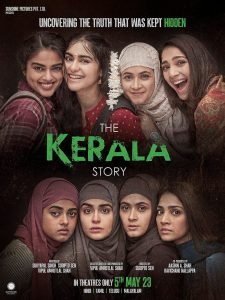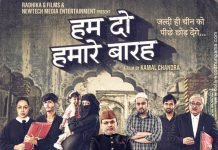Background
The Kerala Story has faced continuous litigation and protests all over India ever since its theatrical release on 5 May 2023. The states of West Bengal and Tamil Nadu even went on to cast shadow bans or a complete ban of the screening of the film in theatres state wide. Multiple petitions were filed at the Kerala and Madras High Courts and the Supreme Court of India against ‘Kerala Story’ for hurting religious statements, propagating communal and religious disharmony, and promoting hate speech, violence against a particular religious community – the Muslims. When the trailer released on 3 November 2022, the claims of conversion of 32,000 Hindu and Christian women to Islam to be recruited by the Islamic States of Iraq and Syria (ISIS) grabbed eyeballs on account of being inaccurate and a false set of misrepresentations. Despite nationwide protests, the film was accredited to be a commercial hit and went on to become one of the highest grossing Hindi films of the year. The litigation, protests, political censorships, shadow ban in the states of Tamil Nadu, West Bengal primarily and Kerala which is discussed at length below:
Latest Happenings & The Legal Point of View
Kerala
The region of Kerala being the geographical area on which the movie is based on, faced major conflicts and uproar. A reward of Rs. 1 crore was announced by the Muslim Youth League to anyone who proves the allegations portrayed in the movie while the Hindu Seva Kendra announced a reward of Rs. 10 crores to anyone proving the contrary, that there has not been a single person from Kerala going to Syria to join the ISIS. The Chief Minister of Kerala, Pinarayi Vijayan issued a statement against the film before its theatrical release, stating the makers of the film and the Central Government are “sowing the poisonous seeds of communalism” through the propaganda film.
A writ petition[i] was filed in the High Court of Kerala on 2nd May ahead of the theatrical release by Muhammed Razak against the Union of India, Central Board of Film Certification (CBFC) and Sunshine Pictures seeking suspension of the trailer and thereafter prohibit the exhibition of the film. The Petitioner invoked the Rule 32 of the Cinematograph (Certification) Rules seeking ‘Re-examination of certified films’ and claimed a particular community is showed in negative light and the movie is based on incorrect and unverified facts. The film was alleged to disturb public order, decency, and morality and particularly the women and Muslim community. However, after viewing the teaser and the trailer, the bench of N Nagaresh and Sophy Thomas, JJ. held the trailers do not contain anything offensive against a particular community. The Court also relied on the credible decision of the statutory authority, CBFC and the presumption that the Board must have considered whether the medium of film is contemptuous of racial, religious groups and promotes communal and anti-national attitudes.
Nagaresh orally stated that “There is something called as freedom of speech and expression. They (film makers) have artistic freedom” while refusing to grant the interim order.
Senior Advocate Ravi Kadam appearing for the producers stated that a disclaimer has been added stating the film is a fictionalized and dramatized version of events hence the film does not claim any accuracy or factuality of historic events. While being questioned on the figure of 32,000 women being converted, Kadam retorted that the teaser which made such claim will be removed.
Tamil Nadu
The state of Tamil Nadu went on high alert around the theatrical release of the film. Officials from the Tamil Nadu Government cited of Islamic groups calling for protests and approached the police seeking a complete ban of the release of the film. Fearing a threat to law and order in the State after inputs from the intelligence wing of the police, a notification alert was issued to the Collectors and Superintendents of Police for maintaining communal harmony and maintaining a vigil on the law and order in the State ahead of the theatrical release of the film.
A Public Interest Litigation (PIL)[ii] was filed by one journalist, BR Aravindakshan against the members of Central Board of Film Certification (CBFC) and the Producer, Vipul Amrutlal Shah on 2nd May 2023. By an order dated 4th May 2023, the Madras High Court through J. A.D Jagadish Chandira and J. C. Saravanan dismissed the PIL and refused a ban on the film. The Court relied on excerpts from Viacom 18 Media Private Limited and others Vs. Union of India[iii] that there exists an elaborate concept of the Censor Board under the Cinematograph Act, 1952 and prima facie the presumption that the concerned Board has considered all the Guidelines framed under the Act including public order.
The agitation went to a great extent after 5th May and the Government and the police intensified police and security forces outside theatres and public places. Furthermore, on 7th May, multiplexes and theatres stopped shows of the ‘Kerala Story’ after protests from Muslim political groups. The president of Tamil Nadu Theatre and Multiplex Owners’ Association further stated that the film has been taken out of all theatres being a Hindi language film and having no recognizable faces.
West Bengal
On 8th May, Mamata Banerjee, the Chief Minister of West Bengal went on to ban ‘Kerala Story’ in the state on the pretext of avoiding any incident of hatred and violence and to maintain peace. Consequently, the Additional Secretary of the Government of West Bengal in the Department of Information and Cultural Affairs passed orders on the same date.
Multiple Public Interest Litigations (PILs) were filed in Calcutta High Court against the decision of the West Bengal Chief Minister and the Government. It was urged by the applicants that the decision was unconstitutional and violative of fundamental rights of the contesting parties, the CBFC and the film makers.
One of the PILs filed by a lawyer, Anindya Sundar Das[iv] was accepted and scheduled to be discussed before the division bench of Chief Justice of Calcutta High Court, T.S Sivagnanam and Justice Hiranmay Bhattacharyya.
Another PIL[v] filed by Devdutta Maji and Surman Ali Mandal touched on the necessity for a public discussion on the issue of ‘love jihad’ in a democracy like India. The plea stated that non-exhibition and a complete ban on the film by the State after the CBFC has granted certification for the theatrical release is ultra vires violative of the constitutional rights of the film makers and the CBFC. Moreover, it was argued that ever since its release in West Bengal on 5th May till the 8th May when the film faced a ban by the Government, there were no incidents of violence, public nuisance, hatred, and uproar.
One of the excerpts from the PIL plea states:
“…the film deals with the malafide acts and plots of the infamous terrorist organization namely ISIS and a story on illegal operation of such a terror outfit is absolutely unlikely to ignite umbrage of the Muslim Community of West Bengal since there is no reason to presume that the Bengali Muslims are sympathizers of ISIS and are against the interest of the Nation.”
The PIL further urged that the Government’s restriction on the movie is violative of the provisions of Section 6 (2) of the West Bengal Cinemas (Regulation) Act of 1954[vi]. This section directs the Commissioner of the Division to provide an opportunity of hearing the persons prevented from exhibiting the film and is based on the principles of ‘Audi Alteram Partem’ (Let the other side be heard).
On 17th May, the Calcutta High Court deferred the hearing in both the PILs filed regarding ban of ‘Kerala Story’ due to the Supreme Court already reviewing a similar petition on the film parallelly.
The Supreme Court
The ruling of the apex Court put the whole commotion surrounding the film in place. The division bench consisting of Hon’ble Chief Justice of India, D.Y Chandrachud, J. Pamidighantam Narasimha, J. Paridwala dealt with the ‘Kerala Story’ in the Supreme Court. On 8th and 9th May, writ petitions were filed against the film and prayers to prohibit the screening. The apex Court dealt with Sunshine Pictures Private Limited vs Union of India[vii] , filed by the makers of the film as an appeal against the Department of Information and Cultural Affairs, West Bengal, and the state of Tamil Nadu. Another petition considered simultaneously was filed by Qurban Ali[viii], a journalist against CBFC and the producers.
On the 18th of May, both the sides advanced their arguments regarding the disputes surrounding the film. Senior Advocate Harish Salve appearing on behalf of the producers contended that the CM of West Bengal made statements against the film with ulterior motives on the exact release date of the film. He further stated that the State saw no law-and-order problems yet it went on to ban the film after it ran for three days while in Tamil Nadu it is facing a “de facto ban” (in practice but not a legal right). Senior Advocate Dr. Abhishek Manu Singhvi appearing for the state of West Bengal stated the ban was levelled after intelligence reports regarding threats to law and order.
After hearing both the sides, the trio division bench observed as follows:
- That the prohibition imposed by West Bengal does not follow the statutory requirements for the imposition of such a prohibition. Hence, the order of the Additional Secretary of the Government of West Bengal in the Department of Information and Cultural Affairs dated May 8, 2023 was stayed.
- In the state of Tamil Nadu, agitations by various Muslim organizations were reported at 19 places. Hence, the Court directed that adequate security be provided to every cinema hall displaying the film and ensuring the safety of the movie goers who wish to see the film. Furthermore, the State or any of its officers including the police shall be restrained from taking any formal or informal steps to prevent the screening.
- The Court directed Sr. Advocate Harish Salve to add a disclaimer regarding the distorted numbers of conversions of Hindu and Christian women by 20th May, 5:00 PM. It was observed that there is no credible data to back the figures and hence, the film represented a fictionalized account of events.
Lastly, the apex Court will hear petitions for final disposal, challenging the grant of certification by CBFC on 18th July 2023.
Links to all orders :SC Order_18-May-2023, Madras HC – PIL Dismissed – 4th May
Concluding Remarks
The journey for ‘Kerala Story’ was a litigious one. While knocking the doors of the Court at the eleventh hour before a film release is often practiced to further frivolous litigations. As much as the Supreme Court’s order lifting bans has been a relief to the makers, the Chief Justice’s words must be rightfully quoted, “As much as we protect free speech, you cannot vilify a community.” Section 295 A of the Indian Penal Code provides for offences hurting religious sentiments. A propaganda to accelerate a political aim should be shunned upon but it is wise to observe that terrorist organizations do exist and if reports of Indians joining such cults are true, then the reality must be portrayed through various mediums, one of the powerful sources being cinema. After lifting the bans, the Chief Justice orally quoted “We’ll first see the film so we can contextualize and then decide. An individual as a film maker has the freedom of speech and expression under Article 19 (1)(a) of the Constitution to portray the reality of the heinous terrorist organizations being a threat to humanity, as elucidated in the landmark judgment of S. Rangarajan vs P. Jagjivan Ram[ix]. Furthermore, once the CBFC reviews and grants a certification to a film, this specialized task entrusted to the Board specially cannot be taken away and individual States cannot restrict the screening of the film. In the case of Gajanan P. Lasure vs CBFC[x], the Bombay High Court held that the Censor Board has specialized expertise in drawing a delicate balance between the constitutionally guaranteed freedom of expression and the statutorily recognized areas of regulation. The Board takes a decision after following a due process and considering all relevant criteria. The Cinematograph Act of 1952 as well as the Rules of 1983 requires the Board to examine whether anti-social activities are glorified or any visuals or words are likely to incite commission of any offence or violence.
End notes
[i] W.P. (C) 15126/2023 (S)
[ii] W.P. No. 14629 of 2023
[iii] (2018) 1 SCC 761
[iv] Anindya Sundar Das vs Union of India and Ors | WPA(P)/229/2023
[v] Devadutta Maji and Anr vs State of West Bengal and Ors | WPA (P)/234/2023
[vi] West Bengal Cinemas (Regulation) Act of 1954, s 6 (2)
[vii] W.P. (C) No. 000552 / 2023
[viii] SLP (C) No. 010166 / 2023
[ix] (1989) 2 SCC 574
[x] 2011 SCC Online Bom 1074
Image source: here












